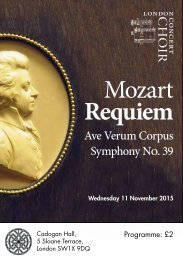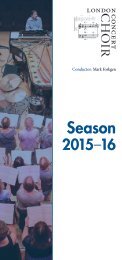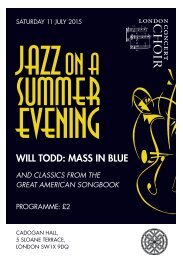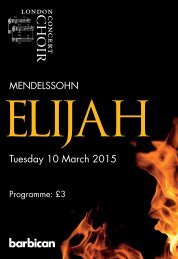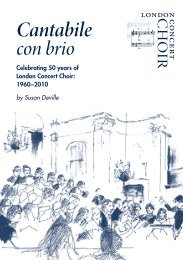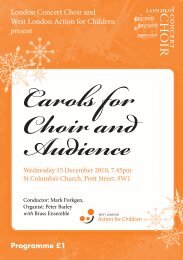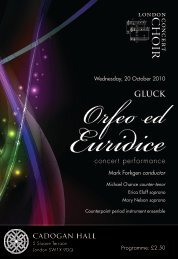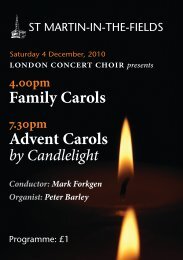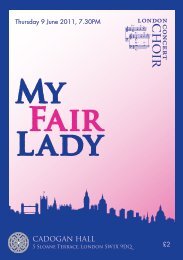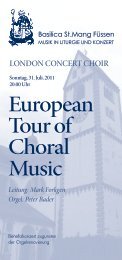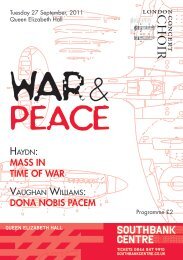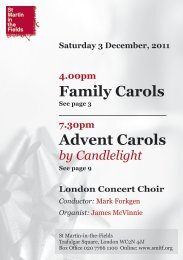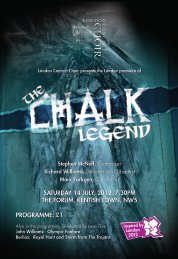14 December 2011: Messiah (Handel)
You also want an ePaper? Increase the reach of your titles
YUMPU automatically turns print PDFs into web optimized ePapers that Google loves.
HANDEL<br />
MESSIAH<br />
London Concert Choir<br />
Counterpoint<br />
Mark Forkgen Conductor<br />
Wednesday <strong>14</strong> <strong>December</strong>, <strong>2011</strong><br />
Programme: £2<br />
Cadogan Hall, 5 Sloane Terrace, London SW1X 9DQ<br />
Booking: 020 7730 4500 / www.cadoganhall.com
WELCOME TO CADOGAN HALL<br />
In the interests of your comfort and safety, please note the following:<br />
• Latecomers will only be admitted to the auditorium during a suitable pause in the<br />
performance.<br />
• Cadogan Hall is a totally non-smoking building.<br />
• Glasses, bottles and food are not allowed in the auditorium.<br />
• Photography, and the use of any video or audio recording equipment, is forbidden.<br />
• Mobiles, Pagers & Watches: please ensure that you switch off your mobile phone<br />
and pager, and deactivate any digital alarm on your watch before the<br />
performance begins.<br />
• First Aid: Please ask a Steward if you require assistance.<br />
Thank you for your co-operation. We hope you enjoy the performance.<br />
_____________________________________________________________________________________________<br />
Programme notes ©<strong>2011</strong> Nancy Goodchild<br />
Programme designed by Stephen Rickett and edited by Eleanor Cowie<br />
London Concert Choir - A company limited by guarantee, incorporated in England<br />
with registered number 3220578 and registered charity number 1057242
HANDEL<br />
MESSIAH<br />
London Concert Choir<br />
Counterpoint<br />
Mark Forkgen Conductor<br />
Erica Eloff Soprano | Christopher Lowrey Counter tenor<br />
James Geer Tenor | Giles Underwood Bass-Baritone<br />
There will be an INTERVAL of 20 minutes after Part One
Hope and support<br />
for troubled children<br />
through art and music……<br />
In our experience, children and young people<br />
may not want to talk about what is troubling<br />
them. At Chance for Children we help those who<br />
have experienced traumatic situations, including<br />
bereavement, domestic violence, war or criminal<br />
activity in their families, to recover by expressing<br />
their feelings in a safe way.<br />
We give them the space and time to do this using<br />
art, earth materials, music, dance and poetry. This<br />
often enables them to show their anger, sadness<br />
and other emotions. They experience relief from<br />
their difficulties, which helps them to improve their<br />
school and social lives, often taking up hobbies<br />
like singing, cadets, swimming, or playing an<br />
instrument. Many go on to become volunteers and<br />
have better chances in their adult lives.<br />
Do help us to help them by giving generously after the concert.<br />
If you are a UK tax payer please use the gift aid envelopes in the programme.<br />
Chance for Children Trust registered charity no 1006359<br />
PO Box 54194, London W5 9FJ 0844 248 4701 www.chancearts.org.uk
GEORGE FRIDERIC HANDEL (1685-1759)<br />
Born February 23, 1685 in Halle, Germany,<br />
died April <strong>14</strong>, 1759 in London<br />
<strong>Messiah</strong> (1741)<br />
A Sacred Oratorio for Soprano, Alto, Tenor and Bass<br />
soloists, Chorus and Orchestra<br />
George Frideric <strong>Handel</strong> was born in the same year as J.S. Bach and Domenico Scarlatti.<br />
His father, the son of a blacksmith and a pastor’s daughter, became a distinguished<br />
physician and acquired a coat of arms (two boys holding medical flasks), which can be<br />
seen today beneath <strong>Handel</strong>’s monument in Westminster Abbey.<br />
<strong>Handel</strong>’s early studies in organ and composition were within his native Lutheran church<br />
traditions but he discovered opera on a trip to Hamburg in 1703 to meet a young composer<br />
called Mattheson (whose sword missed killing <strong>Handel</strong> by a button’s width during a spat<br />
in the pit at a performance of Cleopatra). From 1706-10, <strong>Handel</strong> studied in Rome and<br />
then took up a position in the court of the Elector of Hanover (the future King of England,<br />
George I). He was granted leave to make a trip to London later that year and once again<br />
immersed himself in opera. At that time in London, opera was all the rage and attracting<br />
extraordinary talents – including the greatest castrati singers of the day. <strong>Handel</strong> composed<br />
Rinaldo, produced to much acclaim in 1711, and it was little wonder that, after a brief trip<br />
back to Hanover, <strong>Handel</strong> asked for further leave – which he happened to extend until his<br />
death some forty-eight years later.<br />
Operas such as Julius Caesar, Ariodante and Serse made <strong>Handel</strong> rich as well as famous,<br />
his orchestral music was much performed and he made many personal appearances<br />
playing organ and harpsichord, astonishing his audiences with his powers of dexterity<br />
and improvisation. Although his fortunes fluctuated wildly, <strong>Handel</strong> was greatly admired<br />
and continued to write and perform even when he lost his sight in the last few years of his<br />
life. When he died at the relatively grand age of 74 in 1759, his passing was mourned<br />
across the entire country as a truly national loss.
<strong>Handel</strong> the Man<br />
In an era when the elite social circles in which he operated were small and gossipy and<br />
the London press was even more intrusive and vicious than our modern-day tabloids, it<br />
is extraordinary that <strong>Handel</strong> managed to keep his private life so private. Much has been<br />
read into this but little sustained. What is known is that ‘Mr. Hendel’ presented as a large<br />
and somewhat broody man who “when he did smile, it was his sire the sun bursting out of<br />
a black cloud.” He was well known for his love of food and drink and he cut the satirical<br />
artist Goupy out of his will for publishing a cartoon, entitled The Charming Brute, showing<br />
the composer with the face of a pig, sitting weightily astride a barrel while playing the<br />
organ, above a caption “I am myself alone”. Other records portray a man who was blunt,<br />
explosively temperamental and hugely ambitious but a witty and genial presence and a<br />
great benefactor and philanthropist.<br />
Writing <strong>Messiah</strong><br />
Contemporary correspondence of the time suggests that <strong>Handel</strong> suffered some kind of crisis<br />
(a stroke or acute depression, described as a ‘paraletick disorder’) in the months leading<br />
up to his composition of <strong>Messiah</strong>. For almost thirty years he had enjoyed unrivalled success<br />
and fame in London, as a formidable organist and harpsichord player and the foremost<br />
composer-producer of Italianate opera. But now that this form of ‘foreign’ entertainment<br />
had lost favour with the press and public alike, he was facing artistic and financial ruin.<br />
His friends were concerned, including Shakespeare scholar and sometime poet Charles<br />
Jennens, who had recently collaborated with <strong>Handel</strong> in his experiments with the new<br />
English ‘oratorio’ form – resulting in Saul and Israel in Egypt to mixed reviews. <strong>Handel</strong><br />
turned back to opera but with disastrous box-office results. Jennens wrote in his journal<br />
“<strong>Handel</strong> says he will do nothing next winter but I hope I shall persuade him to set out<br />
another Scripture collection I have made for him, and perform it for his own benefit in<br />
Passion week... The subject is <strong>Messiah</strong>.”<br />
Jennens must, therefore, have been delighted to see his friend inspired to return to old work<br />
habits – eschewing food, coffee house, pipe and drink (all of which he was inordinately<br />
fond of) and foregoing sleep whilst writing in a ‘white heat’ of concentration. After only
three weeks he had completed the entire work and was ready to stage a series of concerts<br />
in Ireland, where he had been invited by the Lord Lieutenant for the following spring.<br />
An extra 100 people squeezed themselves into Neal’s Music Hall in Dublin on 13 th April<br />
1742 (by abandoning their hooped skirts and swords) to witness the first performance<br />
of <strong>Messiah</strong> – the oratorio that has become a cherished mainstay of the choral<br />
repertoire ever since.<br />
Music of <strong>Messiah</strong><br />
Jennens provided <strong>Handel</strong> with a selection of biblical extracts that narrate the promise of<br />
Redemption through the Life and Passion of Christ, in three distinct parts: the prophecy<br />
of God’s plan to redeem mankind through the coming of the <strong>Messiah</strong>; the suffering and<br />
sacrifice of Christ in the face of man’s cruelty and rejection, and a hymn of thanksgiving<br />
for Christ’s eventual victory over Death. Although <strong>Messiah</strong> resembles the great Lutheran<br />
Passions of contemporaries such as Schütz and Bach, it does not provide a direct narrative<br />
but rather the biblical excerpts offer a more meditative commentary on the redemptive<br />
nature of Christ’s earthly mission and sacrifice for mankind.<br />
The legendary swiftness with which <strong>Handel</strong> composed this work can be partially<br />
explained by his borrowings from his own earlier compositions – by no means an<br />
unusual practice in his day. For example, the melodies used in the two choruses And<br />
He shall purify and His yoke is easy were taken from an Italian chamber duet he had<br />
written earlier in 1741. Another secular duet provided material for the famous chorus<br />
For unto us a Child is born, and All we like sheep borrows its wandering phrases,<br />
imitating the calls of lost sheep, from the same duet. In each case, however, <strong>Handel</strong><br />
carefully reworks his themes and the light-heartedness of the secular originals is given new<br />
and appropriate depth.<br />
The writing for soloists is, likewise, at once full of dramatic colour and profound emotions<br />
– God’s shaking of the heavens and the earth, the sudden and surprising appearance of<br />
angels to the shepherds, the tenderness with which Christ cares for His ‘flock’, the sorrow<br />
of Christ rejected, the raging of His persecutors and the calm certainty that redemption is<br />
secured for us by Christ’s sacrifice – all are vividly conveyed in <strong>Handel</strong>’s masterful writing.
The consistent beauty and nobility of the music itself, the high proportion of music provided<br />
for the choir, the graceful and relatively simple nature of the arias and the pared-down<br />
orchestral scoring (the strings and continuo of the Dublin performance only augmented,<br />
though with wonderful effect, by oboes, trumpets and drums for his London performances)<br />
have made <strong>Messiah</strong> one of the most frequently performed and beloved of all oratorios.<br />
To Stand or not to Stand?<br />
King George II had a well known passion for music and opera but owing to the fractious<br />
nature of the King’s relationship with his father (George I), he had begun by despising his<br />
father’s favourite composer. It was not until <strong>Handel</strong> composed some anthems for George II’s<br />
own coronation that the King became a patron as well as an admirer. His most famous<br />
tribute to the composer, however, is believed by some <strong>Handel</strong> scholars nowadays to be<br />
apocryphal. The tradition in England of standing for the Hallelujah chorus is said to have<br />
come from the moment when the King was sufficiently moved to rise from his seat and, of<br />
course, everyone else had to follow his example.<br />
Please feel free to stand at tonight’s performance of the chorus if you wish!<br />
<strong>Messiah</strong> and Charitable Causes<br />
On 16 th May 1751, <strong>Handel</strong> began to put on annual productions of <strong>Messiah</strong> in the<br />
chapel of London’s Foundling Hospital. This entailed yet more revisions of the work by<br />
the composer to suit the performers available at the time and here included the use of the<br />
chapel’s outstanding boy trebles for some solos as well as for the top line of the chorus.<br />
These concerts were also unusual in that the chapel was the only consecrated space<br />
that <strong>Handel</strong> ever used for his own <strong>Messiah</strong> performances. There is very little reportage<br />
to support the notion that <strong>Handel</strong> intended the work to be evangelical but a great deal<br />
of evidence that he wanted to enable its audiences to support charitable work for the<br />
destitute and needy. In this spirit, London Concert Choir is delighted to be associated<br />
tonight with the charity Chance for Children.
Text of <strong>Messiah</strong><br />
PART ONE<br />
SINFONIA [OVERTURE]<br />
RECITATIVE (Tenor)<br />
Comfort ye, comfort ye My people, saith your God.<br />
Speak ye comfortably to Jerusalem and cry unto her that her warfare is accomplish’d,<br />
that her iniquity is pardoned.<br />
The voice of him that crieth in the wilderness, Prepare ye the way of the Lord, make<br />
straight in the desert a highway for our God.<br />
AIR (Tenor)<br />
Ev’ry valley shall be exalted, and ev’ry mountain and hill made low,<br />
the crooked straight, and the rough places plain.<br />
CHORUS<br />
And the glory of the Lord shall be revealed, and all flesh shall see it together:<br />
for the mouth of the Lord hath spoken it.<br />
RECITATIVE (Bass)<br />
Thus saith the Lord of Hosts: Yet once, a little while and I will shake the heavens and<br />
the earth, the sea and the dry land: and I will shake all nations; and the desire of all<br />
nations shall come: the Lord, whom ye seek, shall suddenly come to His temple, e’en the<br />
messenger of the covenant, whom ye delight in; behold, He shall come, saith the Lord of<br />
Hosts.<br />
AIR (Alto)<br />
But who may abide the day of His coming? And who shall stand when He appeareth?<br />
For He is like a refiner’s fire.<br />
CHORUS<br />
And He shall purify the sons of Levi, that they may offer unto the Lord an offering in<br />
righteousness.<br />
RECITATIVE (Alto)<br />
Behold! a virgin shall conceive and bear a Son, and shall call His name Emmanuel,<br />
‘GOD WITH US’.<br />
AIR (Alto) AND CHORUS<br />
O thou that tellest good tidings to Zion, get thee up into the high mountain;<br />
O thou that tellest good tidings to Jerusalem, lift up thy voice with strength;<br />
lift it up, be not afraid; say unto the cities of Judah, Behold your God!<br />
Arise, shine, for thy light is come, and the glory of the Lord is risen upon thee.
O thou that tellest good tidings to Zion, good tidings to Jerusalem, arise; say unto the<br />
cities of Judah, Behold your God! Behold; the glory of the Lord is risen upon thee.<br />
RECITATIVE (Bass)<br />
For behold, darkness shall cover the earth, and gross darkness the people;<br />
but the Lord shall arise upon thee, and His glory shall be seen upon thee.<br />
And the Gentiles shall come to thy light, and kings to the brightness of thy rising.<br />
AIR (Bass)<br />
The people that walked in darkness have seen a great light; and they that dwell in the<br />
land of the shadow of death; upon them hath the light shined.<br />
CHORUS<br />
For unto us a Child is born, unto us a Son is given,<br />
and the government shall be upon His shoulder;<br />
and His Name shall be called Wonderful Counsellor,<br />
the Mighty God, the Everlasting Father, the Prince of Peace.<br />
PASTORAL SYMPHONY<br />
RECITATIVE (Soprano)<br />
There were shepherds abiding in the field, keeping watch over their flocks by night. And<br />
lo! the angel of the Lord came upon them, and the glory of the Lord shone round about<br />
them, and they were sore afraid.<br />
And the angel said unto them, Fear not; for behold, I bring you good tidings of great joy,<br />
which shall be to all people.<br />
For unto you is born this day in the City of David a Saviour, which is Christ the Lord.<br />
And suddenly there was with the angel a multitude of the heav’nly host, praising God,<br />
and saying:<br />
CHORUS<br />
Glory to God in the highest, and peace on earth, goodwill toward men.<br />
AIR (Soprano)<br />
Rejoice greatly, O daughter of Zion Shout, O daughter of Jerusalem!<br />
Behold, thy King cometh unto thee.<br />
He is the righteous Saviour and He shall speak peace unto the heathen.<br />
RECITATIVE (Alto)<br />
Then shall the eyes of the blind be open’d, and the ears of the deaf unstopped.<br />
Then shall the lame man leap as an hart, and the tongue of the dumb shall sing.
AIR (Alto & Soprano)<br />
He shall feed his flock like a shepherd, and He shall gather the lambs with His arm, and<br />
carry them in His bosom, and gently lead those that are with young.<br />
Come unto Him, all ye that labour. Come unto Him, ye that are heavy laden, and He will<br />
give you rest.<br />
Take His yoke upon you, and learn of Him,<br />
for He is meek and lowly of heart, and ye shall find rest unto your souls.<br />
CHORUS<br />
His yoke is easy, His burthen is light.<br />
INTERVAL – 20 Minutes<br />
PART TWO<br />
CHORUS<br />
Behold the Lamb of God that taketh away the sins of the world.<br />
AIR (Alto)<br />
He was despised and rejected of men, a man of sorrows, and acquainted with grief.<br />
He gave His back to the smiters, and His cheeks to them that plucked off the hair.<br />
He hid not his face from shame and spitting.<br />
CHORUS<br />
Surely He hath borne our griefs, and carried our sorrows!<br />
He was wounded for our transgressions, He was bruised for our iniquities;<br />
the chastisement of our peace was upon Him.<br />
CHORUS<br />
And with His stripes we are healed.<br />
CHORUS<br />
All we like sheep have gone astray; we have turned ev’ry one to his own way.<br />
And the Lord hath laid on Him the iniquity of us all.<br />
RECITATIVE (Tenor)<br />
All they that see Him, laugh Him to scorn; they shoot out their lips, and shake their<br />
heads, saying:<br />
CHORUS<br />
He trusted in God that He would deliver Him, let Him deliver Him, if He delight in Him.
RECITATIVE (Tenor)<br />
Thy rebuke hath broken His heart; He is full of heaviness.<br />
He looked for some to have pity on him, but there was no man, neither found He any to<br />
comfort Him.<br />
AIR (Tenor)<br />
Behold, and see if there be any sorrow like unto His sorrow.<br />
RECITATIVE (Tenor)<br />
He was cut off out of the land of the living; for the transgression of Thy people was He<br />
stricken.<br />
AIR (Tenor)<br />
But Thou didst not leave His soul in hell, nor didst Thou suffer Thy Holy One to see<br />
corruption.<br />
CHORUS<br />
Lift up your heads, O ye gates, and be ye lift up, ye everlasting doors, and the King of<br />
Glory shall come in.<br />
Who is this King of Glory? The Lord strong and almighty, the Lord mighty in battle.<br />
Lift up your heads, O ye gates, and be ye lift up, ye everlasting doors,<br />
and the King of Glory shall come in.<br />
Who is this King of Glory? The Lord of Hosts, He is the King of Glory.<br />
AIR (Soprano)<br />
How beautiful are the feet of them that preach the gospel of peace, and bring glad<br />
tidings of good things.<br />
CHORUS<br />
Their sound is gone out into all lands, and their words unto the ends of the world.<br />
AIR (Bass)<br />
Why do the nations so furiously rage together, and why do the people imagine a vain<br />
thing?<br />
The kings of the earth rise up, and the rulers take counsel together against the Lord, and<br />
against His anointed.<br />
CHORUS<br />
Let us break their bonds asunder, and cast away their yokes from us.<br />
RECITATIVE (Tenor)<br />
He that dwelleth in heaven shall laugh them to scorn;<br />
the Lord shall have them in derision.<br />
AIR (Tenor)<br />
Thou shall break them with a rod of iron;<br />
Thou shall dash them in pieces like a potter’s vessel.
CHORUS<br />
Hallelujah: for the Lord God Omnipotent reigneth.<br />
The kingdom of this world is become the Kingdom of our Lord, and of His Christ;<br />
and He shall reign for ever and ever.<br />
King of Kings, and Lord of Lords. HALLELUJAH!<br />
PART THREE<br />
AIR (Soprano)<br />
I know that my Redeemer liveth, and that He shall stand at the latter day upon the earth;<br />
and though worms destroy this body, yet in my flesh shall I see God.<br />
For now is Christ risen from the dead, the first-fruits of them that sleep.<br />
CHORUS<br />
Since by man came death, by man came also the resurrection of the dead.<br />
For as in Adam all die, even so in Christ shall all be made alive.<br />
RECITATIVE (Bass)<br />
Behold! I tell you a mystery; we shall not all sleep; but we shall all be changed in a<br />
moment, in the twinkling of an eye, at the last trumpet.<br />
AIR (Bass)<br />
The trumpet shall sound, and the dead shall be raised incorruptible, and<br />
we shall be changed.<br />
For this corruptible must put on incorruption and this mortal must put on immortality.<br />
CHORUS<br />
Worthy is the Lamb that was slain, and hath redeemed us to God by His blood,<br />
to receive power, and riches, and wisdom, and strength, and honour,<br />
and glory, and blessing.<br />
Blessing and honour, glory and pow’r, be unto Him that sitteth upon the throne,<br />
and unto the Lamb, for ever and ever.<br />
Amen.
Mark Forkgen – Conductor<br />
Mark Forkgen has been Music Director of London Concert<br />
Choir since 1996. He is also Music Director of Canticum<br />
chamber choir and Principal Conductor and Artistic Advisor of<br />
Kokoro, the Bournemouth Symphony Orchestra’s New Music<br />
Group. He has worked with a number of leading orchestras,<br />
including the Orchestra of the Age of Enlightenment, Royal<br />
Philharmonic Orchestra, Bournemouth Symphony Orchestra,<br />
City of London Sinfonia, English Chamber Orchestra, English<br />
Northern Philharmonia and the Composers’ Ensemble, appearing at all the major venues,<br />
including the Royal Festival Hall, the Barbican and the Royal Albert Hall.<br />
A specialist in the field of choral and contemporary music, Mark has given the first<br />
performances of around 100 works. These include stage works with the Trestle Theatre<br />
Company and Britten Sinfonia, and contemporary opera with the Unicorn Theatre<br />
Company and an ensemble from the Philharmonia, at the Linbury Studio Theatre, Royal<br />
Opera House, Covent Garden. His wide range of conducting also includes performances<br />
with Deep Purple for the Henley Festival and recreating Pink Floyd’s Atom Heart Mother<br />
in the Chelsea Festival.<br />
Mark has been Conductor and Artistic Advisor for highly acclaimed festivals including:<br />
Sir Peter Maxwell Davies’ 70th Birthday; Stravinsky, ‘A Festival of Britten’, ‘Music of the<br />
Americas’, ‘Britain since Britten’ and ‘East meets West’. His recordings with Canticum<br />
and Kokoro have been highly recommended by BBC Radio 3 as well as both musical and<br />
national press. In Europe he has conducted in Spain, France, Belgium, Germany, Holland<br />
and the Czech Republic. He has also given performances of Stravinsky’s The Rite of Spring<br />
in Denmark, as well as <strong>Handel</strong>’s <strong>Messiah</strong> and Israel in Egypt in Siena and at the Viterbo<br />
Early Music Festival in Italy.<br />
Autumn highlights this season include productions of Stephen Sondheim’s Sweeney<br />
Todd and Stravinsky’s A Soldier’s Tale in addition to concerts featuring four premieres as<br />
part of the BSO’s ‘Living Tradition’ Series and with Sir Peter Maxwell Davies.<br />
A champion of Youth Music, Mark was the Conductor of the Scottish Schools Orchestra<br />
for ten years and Music Director of Ealing Youth Orchestra for eight years. He is currently<br />
Conductor of Dorset Youth Orchestra and Director of Music at Tonbridge School.
Erica Eloff – Soprano<br />
Erica was born in South Africa. She graduated from the<br />
Potchefstroom University with a B.Mus degree and postgraduate<br />
Diploma in Performance (Cum Laude), studying voice<br />
with Werner Nel. In the UK she has studied with Lillian Watson<br />
and continues to study with Sheila Barnes. During her studies<br />
Erica was awarded several prizes and scholarships by her<br />
university and various national institutions. She is a laureate<br />
of several national and international singing competitions,<br />
including first prize in the 2008 London <strong>Handel</strong> Competition.<br />
Her many concert performances in the UK, Germany, Norway and South Africa include<br />
the major repertoire by Bach, Beethoven, Brahms, Fauré, <strong>Handel</strong>, Haydn, Mozart, Orff,<br />
Rutter, Verdi and Vivaldi, as well as lesser-known works by Gounod, Schubert, Vaughan<br />
Williams, Dvorak and the South African composer Martin Watt. She has appeared in<br />
major concert venues with, amongst others, the Chamber Orchestra of South Africa,<br />
London Mozart Players, Royal Philharmonic Orchestra, Southbank Sinfonia and the New<br />
London Sinfonia.<br />
Operatic roles in South Africa include Barbarina in Le nozze di Figaro, Despina in Così<br />
fan tutte, Adèle in Die Fledermaus, Adina in L’elisir d’amore and the Queen of the Night in<br />
Die Zauberflöte. Since living in the UK she has sung Fiordiligi in Così fan tutte, the Queen<br />
of the Night and First Lady (Die Zauberflöte), Violetta (La Traviata) and Belinda (Dido and<br />
Aeneas). She joins Opera North for their <strong>2011</strong>-12 season as a visiting artist.<br />
As an active chamber musician, Erica has presented world premieres of music by South<br />
African and English composers, including works specifically written for her. She has also<br />
been extremely fortunate to collaborate with Lawrence Cummings and the London <strong>Handel</strong><br />
Players on several occasions, including performing <strong>Messiah</strong> in <strong>Handel</strong>’s own church, St<br />
George’s, Hanover Square. Other highlights include singing <strong>Handel</strong>’s solo cantatas in his<br />
London home as well as <strong>Messiah</strong> in the Royal Albert Hall under Sir David Willcocks.<br />
A passionate performer of Lieder, Erica is keen to expand the audience’s knowledge and<br />
appreciation by including lesser-known pieces in her recitals. She has given recitals at<br />
all the major South African Arts Festivals and, following her Wigmore Hall solo debut in<br />
their 2008/09 season as a Kirckman Young Artist, was invited to return in their 2009/10<br />
season. In addition to her work as soloist, Erica is keen to help amateur singers develop<br />
their skills and, when time allows, helps to develop her children’s school choir.<br />
Her previous appearances with Mark Forkgen and LCC include Mozart’s Coronation<br />
Mass, Orff’s Carmina Burana, and, most notably, in the part of Eurydice in Gluck’s opera<br />
Orfeo ed Euridice.
Christopher Lowrey – Counter tenor<br />
Originally from the United States, Christopher Lowrey holds<br />
degrees from Brown University, Cambridge University and<br />
the Royal College of Music. While at Cambridge, he was a<br />
choral scholar at Trinity College and was fully supported<br />
by the Keasbey Memorial Scholarship. He is currently on<br />
the advanced opera course at the Royal College of Music<br />
International Opera School, supported by the Hilary Fabian<br />
Award and the Josephine Baker Trust.<br />
Christopher won the London <strong>Handel</strong> Society’s Michael Oliver Prize as runner-up in the<br />
2010 <strong>Handel</strong> Singing Competiton. He was a finalist in the 2008 London Bach Society<br />
Competition, the 2006 Fulbright Scholarship competition, and in 2005 was awarded<br />
first prize at the Rhode Island competition of the National Association of Teachers of<br />
Singing. Currently, he is a voice student of Derek Lee Ragin, and has previously studied<br />
with Ashley Stafford and Pierre Masse. He holds a full-time singing post at St Peter’s, Eaton<br />
Square, and performs regularly with professional choral groups, including Polyphony<br />
and English Voices.<br />
Christopher made his solo international debut with Bach Collegium Japan under Masaaki<br />
Suzuki in <strong>Handel</strong>’s <strong>Messiah</strong> and returned to Japan this season to perform Goffredo in a<br />
concert version of Rinaldo. Here and abroad his reputation is growing, and this year he<br />
will make his debut with various ensembles around the world.<br />
His recent roles include Mirtillo in <strong>Handel</strong>’s Il Pastor Fido as part of the 2010 London<br />
<strong>Handel</strong> Festival, Oberon in the RCM’s production of Britten’s A Midsummer Night’s Dream,<br />
the title role in <strong>Handel</strong>’s Alessandro as part of the 2009 London <strong>Handel</strong> Festival, and<br />
Orpheus in Gluck’s Orfeo ed Euridice. Concert appearances include a celebration of<br />
<strong>Handel</strong>’s music with the Aldeburgh Music Club; Bach’s Magnificat and Vivaldi’s Gloria<br />
with the Ecclesia Consort of New England; <strong>Handel</strong>’s Dixit Dominus with Caius College<br />
Music Society; <strong>Handel</strong>’s <strong>Messiah</strong>, Mozart’s Requiem, and <strong>Handel</strong>’s Coronation Anthems<br />
with the Trinity Singers; David in Boston University’s production of <strong>Handel</strong>’s Saul;<br />
Purcell’s Jubilate Deo, J.S. Bach’s Missa Brevis and St John Passion, Purcell’s Dido and<br />
Aeneas and Charpentier’s Te Deum with the Brown University Chamber Choir; and several<br />
Bach Cantata concerts with Musica Maris.<br />
Christopher is featured as a soloist on recordings of <strong>Handel</strong>’s Dettingen Te Deum and<br />
a disc of choral music entitled ‘Baltic Exchange’, both with Trinity College Choir, on the<br />
Hyperion label. He is also involved in a wide range of consort groups. He is the founder<br />
and director of The Cambridge Clerkes, a group specializing in sacred music of the English<br />
Renaissance, and directs Ensemble Altera, an American-based early music ensemble.
James Geer – Tenor<br />
Hailing from Sussex, James studied at Magdalen College,<br />
Oxford, where he sang as an Academical Clerk in the College<br />
Choir; at Trinity College of Music and on the Opera Course at<br />
the Royal Scottish Academy of Music and Drama, graduating<br />
in 2008. While at college James won numerous scholarships<br />
and competitions, including the Morag Noble Award, the Catto<br />
Scholarship and the Principal’s Award for the outstanding<br />
student performance of the year.<br />
After graduating James was invited to become a Britten/Pears Scholar and has appeared<br />
in numerous performances at the Snape Maltings, notably as Male Chorus in The Rape<br />
of Lucretia, conducted by David Parry, and Mathan in Athalia, conducted by Richard<br />
Egarr. He has also appeared at the Snape Easter Festival in Mozart’s Requiem conducted<br />
by Bernard Labadie and at the Aldeburgh Festival, where he performed Britten’s Sechs<br />
Holderlin Fragmente with Malcolm Martineau. This concert was recently broadcast on<br />
BBC Radio 3.<br />
Concert appearances have included L’Aumonier in Les Dialogues des Carmelites with<br />
Stephane Deneve and the RSNO, Dido and Aeneas with Nicholas McGeegan and the<br />
ECO, both at the Edinburgh International Festival. James has performed <strong>Messiah</strong> at the<br />
Royal Albert Hall under Sir David Willcocks as well as with numerous choral societies<br />
throughout the UK, including Leeds Philharmonic Society, Bristol Choral Society and at the<br />
Hexham Music Festival. Most recently, James performed Britten’s Saint Nicolas with the<br />
Bournemouth Symphony Orchestra and Chorus and <strong>Handel</strong>’s Saul with the BBC National<br />
Orchestra of Wales under Nicolas Kraemer. He also appeared in London Concert Choir’s<br />
recent semi-staged performance of Lerner and Loewe’s My Fair Lady.<br />
James’ operatic roles performed while at college include Don Ottavio (Don Giovanni),<br />
Monsieur Triquet (Eugene Onegin), Gonzalves (L’Heure Espagnol), L’Aumonier (Les<br />
Dialogues des Carmelites), Duncan (The Albatross), The Singer (Beatrice Cenci) and Le<br />
Berger (Oedipus Rex). Roles elsewhere include Male Chorus (The Rape of Lucretia) at the<br />
Snape Maltings, Acis (Acis and Galatea) with Edinburgh Studio Opera and Frederic (The<br />
Pirates of Penzance) for Haddo House Opera. James has recently been covering roles for<br />
Glyndebourne on Tour and Music Theatre Wales.<br />
Recent recital appearances include Schubert songs and Mozart arias at the Wigmore Hall<br />
accompanied by Malcolm Martineau and a series of concerts entitled ‘Unexplored Britten’<br />
with pianist Ronald Woodley. A recent studio recording of Britten songs with Malcolm will<br />
be available on the Onyx label later this year.
Giles Underwood – Bass-Baritone<br />
After reading Biology at Magdalen College, Oxford, Giles<br />
attended postgraduate and opera courses at the Guildhall<br />
School of Music and Drama, where he won prizes for English<br />
and Contemporary Song and was generously supported by<br />
the Foyle Foundation. He studied then, as now, with Susan<br />
McCulloch.<br />
On the concert platform, he has sung with most of the country’s<br />
major orchestras, and is a regular soloist with The Academy of<br />
Ancient Music. He has performed in recital at Wigmore Hall<br />
and Purcell Room. As a proponent of contemporary music, he has premiered works by<br />
James Macmillan, Judith Bingham, Adam Gorb, Richard Peat and Edward Dudley Hughes,<br />
in whose opera, The Birds, he created the role of Hoopoe at the Buxton Festival. He was<br />
also in the original cast of The Full Monteverdi, a ground-breaking take on Monteverdi’s<br />
Fourth Book of Madrigals, which ran for 88 performances and is now a successful feature<br />
film. His previous performances with London Concert Choir include Britten’s War Requiem<br />
in Salisbury Cathedral.<br />
His operatic roles include; Don Giovanni, Guglielmo (Cosi fan tutte), Conte Almaviva<br />
(Le Nozze di Figaro), Tarquinius (The Rape of Lucretia), Marcello (la Bohème), Sykos<br />
(Martinu’s Comedy on the Bridge), Claudio (Béatrice et Bénédict), Aeneas & Sorceress<br />
(Dido and Aeneas), Bruno (James Macmillan’s Parthenogenesis), Erimante (Cavalli’s<br />
L’Erismena), Adonis (Venus and Adonis), Falstaff (Salieri).<br />
Recent engagements include appearances at the Queen Elizabeth Hall, Wigmore Hall, The<br />
Temple Festival, The Oxford Lieder Festival, the Three Choirs Festival and The Royal Albert<br />
Hall. He is a regular contributor on the BBC, with most recently, a live broadcast of Venus<br />
and Adonis at the York Early Music Festival.<br />
Giles is also much in demand as a teacher and vocal coach, with students at both Oxford<br />
and Cambridge Universities.
London Concert Choir<br />
London Concert Choir celebrated its 50th Anniversary in<br />
2010. Having begun life as Brompton Choral Society, the<br />
choir was relaunched under its new name in 1986. Now<br />
with around 150 members of a wide range of ages the<br />
choir is notable for the conviction and expressiveness of its<br />
performances in an unusually broad musical repertoire. It<br />
regularly appears at all the major London concert venues,<br />
including the Barbican, the Southbank Centre and St Martinin-the-Fields,<br />
as well as Cadogan Hall, and in cathedrals and<br />
churches in and around the capital.<br />
The highlight of last season was an exchange with the<br />
Augsburg Basilica Choir. This began in March with a joint<br />
performance of Verdi’s Requiem at the Royal Festival Hall,<br />
then in July LCC visited Germany to perform Haydn’s Mass<br />
in Time of War and Vaughan Williams’ Dona Nobis Pacem<br />
with the Basilikachor at the Augsburg Peace Festival.<br />
Earlier seasons have included choral music from the 16th<br />
to the 21st centuries; and <strong>Handel</strong>’s Coronation Anthems,<br />
Haydn’s oratorio The Creation and the London premiere<br />
of a reconstruction of Mozart’s C minor Mass – all with<br />
Counterpoint.<br />
Among large-scale choral works have been Beethoven’s Missa<br />
Solemnis with the English Chamber Orchestra and Vaughan<br />
Williams’ Sea Symphony with the Royal Philharmonic<br />
Orchestra. Two memorable performances of Britten’s War<br />
Requiem – at the Barbican with Southbank Sinfonia, and in<br />
Salisbury Cathedral with Dorset Youth Orchestra – marked<br />
the choir’s anniversary year.<br />
Concert performances of operas and musicals include Gluck’s<br />
Orfeo ed Euridice, Purcell’s Dido and Aeneas, Gershwin’s<br />
Porgy and Bess and Lerner and Loewe’s My Fair Lady. LCC<br />
has also presented Duke Ellington’s Sacred Concert and Orff’s<br />
Carmina Burana, and appeared in the Star Wars concerts at<br />
the O2 Arena. The choir often gives concerts for charity and<br />
has commissioned a number of new works over the years.<br />
Mark Forkgen<br />
Music Director<br />
James Longford<br />
Principal Accompanist<br />
Bill Cook<br />
Chairman<br />
Will Tilden<br />
Concert Manager<br />
Barbara Whent<br />
Treasurer<br />
Stephen Rickett<br />
Design and<br />
Communications<br />
Jennifer Greenway<br />
Membership<br />
Eleanor Cowie<br />
Publicity<br />
Simon Livesey<br />
Company Secretary<br />
www.london-concert-choir.org.uk
Counterpoint<br />
The ensemble ‘Counterpoint’ was formed in 2000 specifically to work with vocal<br />
ensembles. Its membership is drawn from the leading young period instrument specialists<br />
living and working in London, players who have performed and recorded with many of<br />
the leading British early music ensembles, such as the English Baroque Soloists, the Parley<br />
of Instruments, Florilegium, The Academy of Ancient Music and The English Concert.<br />
The members of Counterpoint have a great deal of expertise and are therefore comfortable<br />
in a wide range of idioms from Monteverdi through to Beethoven. The ensemble uses<br />
original instruments or excellent copies made using the latest theories and techniques of<br />
historic instrument manufacture.<br />
In the summer of 2004 they opened the prestigious Viterbo Early Music Festival in Italy,<br />
performing <strong>Handel</strong>’s Israel in Egypt with Canticum and Mark Forkgen. Further highlights<br />
have included <strong>Handel</strong>’s <strong>Messiah</strong>, Bach’s St John Passion, St Matthew Passion and Mass in<br />
B Minor. In 2009 they performed Monteverdi’s Vespers at St Martin-in-the-Fields as well as<br />
Haydn’s Creation in the final concert of the Chichester Festival with Canticum.<br />
Counterpoint have previously joined London Concert Choir in Haydn’s Nelson Mass,<br />
<strong>Handel</strong>’s Foundling Hospital Anthem, Purcell’s Dido and Aeneas, the London premiere<br />
of the completed version of Mozart’s C Minor Mass, Beethoven’s Ninth Symphony and<br />
Mass in C, Haydn’s The Creation at Guildhall and a concert performance of Gluck’s opera<br />
Orfeo ed Euridice.<br />
Leader<br />
Catherine Martin<br />
First Violin<br />
Iona Davies<br />
Sarah Bealby-Wright<br />
Ben Sansom<br />
Susan Carpenter-Jacobs<br />
Ann Monnington<br />
Second Violin<br />
Oliver Webber<br />
Kathryn Parry<br />
Fiona Hugget<br />
Felicity Broome-Skelton<br />
Veronique Materaso<br />
Viola<br />
Peter Collyer<br />
Stefanie Heichelheim<br />
Alexis Bennett<br />
Alex Lawrence<br />
Cello<br />
Anna Holmes<br />
Chris Suckling<br />
Emily Robinson<br />
Bass<br />
Timothy Amherst<br />
Kate Aldridge<br />
Oboe<br />
Hannah McLaughlin<br />
Gail Hennessey<br />
Bassoon<br />
Frances Eustace<br />
Trumpet<br />
Richard Fomison<br />
Richard Thomas<br />
Timpani<br />
Robert Kendall<br />
Organ<br />
James Longford
Members of London Concert Choir<br />
Soprano<br />
Hannah Baker<br />
Gillian Bibby<br />
Dagmar Binsted<br />
Sarah Burr<br />
Jane Cameron<br />
Alison Carpenter<br />
Eleanor Cowie<br />
Sally Davis<br />
Gillian Denham<br />
Susan Deville<br />
Nicola Dixon-Brown<br />
Emily Dresner<br />
Rachel Duffield<br />
Serena Ede<br />
Erika Emerson<br />
Sarah French<br />
Lisa Gardner<br />
Johanna Goll<br />
Jennifer Greenway<br />
Emma Heath<br />
Christine Ingram<br />
Lisa Janson<br />
Jane Joyce<br />
Caroline Kameen<br />
Vickie Kelly<br />
Anna Kosicka<br />
Katie Lane<br />
Susan Logan<br />
Susanna Lutman<br />
Megan Maley<br />
Elite Marriott<br />
Nadine Martin<br />
Jessica Metcalfe<br />
Jenny Moran<br />
Stephanie Moussadis<br />
Jeanette Murphy<br />
Carolyn Newman<br />
Fiona Paterson<br />
Jutta Raftery<br />
Rachel Rosenberg<br />
Ella Salter<br />
Rachel Scanlon<br />
Frances Shaw<br />
Martina Steber<br />
Philippa Stroud<br />
Shereen Taylor-Berger<br />
Amy Thomas<br />
Teresa Tilden<br />
Francesca Walsh<br />
Janet Wells<br />
Julie Wilson<br />
Alto<br />
Rachel Armstrong<br />
Helen Beddall-Smith<br />
Venetia Browne<br />
Frances Cave<br />
Carys Cooper<br />
Deborah Curle<br />
Lizzie Davies<br />
Georgina Day<br />
Kathleen Dormer<br />
Alena Faltova<br />
Rebecca Foulkes<br />
Anna Garnier<br />
Netta Geist<br />
Mary Glanville<br />
Nancy Goodchild<br />
Muriel Hall<br />
Joan Herbert<br />
Tina Holderried<br />
Caroline Holloway<br />
Chrina Jarvis<br />
Chris Joseph<br />
Sabine Koellmann<br />
Joanna Kramer<br />
Meghana Kumar<br />
Lorna Lewis<br />
Norma MacMillan<br />
Bridget Maidment<br />
Anna Metcalf<br />
Sophy Miles<br />
Judith Paterson<br />
Rachel Pearson<br />
Gillian Perry<br />
Katja Pluto<br />
Dubravka Polic<br />
Katie Prior<br />
Caroline Rawlence<br />
Annette Riel<br />
Mary Ann Sieghart<br />
Tabitha Strydom<br />
Kate Tranter<br />
Rachel Vroom<br />
Gabriel West<br />
Barbara Whent<br />
Belinda Whittingham<br />
June Williams<br />
Tenor<br />
Richard Black<br />
Andrew Bolan<br />
Deborah Bono<br />
Christopher Boustred<br />
David Broad<br />
Adam Csatadi<br />
James Ede<br />
Fabyan Evans<br />
John Galt<br />
Nicholas Hall<br />
Sam Hansford<br />
Richard Holmes<br />
Carolyn Knight<br />
Eli Konvitz<br />
Ben Martin<br />
Stephen Rickett<br />
Tim Steer<br />
Tim Thirlway<br />
Bass<br />
Colin Allies<br />
Peter Banks<br />
Graeme Biggar<br />
Richard Burbury<br />
Jim Cameron<br />
Daniel Cockayne<br />
Bill Cook<br />
Henry Cook<br />
Andrew Cullen<br />
Albert Edwards<br />
Richard Gillard<br />
Nigel Grieve<br />
Nigel Hartnell<br />
Martin Harvey<br />
Graham Hick<br />
Julian Hofmann<br />
David Ireland<br />
Ian Judson<br />
Robert Kealey<br />
Stephen Kingston<br />
Stefan Klaazen<br />
Vilem Kriz<br />
Simon Livesey<br />
Angus Macdonald<br />
Alan Machacek<br />
Ian Mackintosh<br />
Asher Murphy<br />
Christopher Powell-<br />
Smith<br />
Dai Prichard<br />
Simon Retallack<br />
Morgan Roberts<br />
Anthony Sharp<br />
Ryszard Stepaniuk<br />
William Tilden<br />
Tony Trowles<br />
Dai Whittingham
Mailing List<br />
If you would like to receive advance information about our concerts, why not join London<br />
Concert Choir’s FREE mailing list?<br />
You can send an email to: mailinglist@london-concert-choir.org.uk<br />
Alternatively you can write to:<br />
Jenny Moran<br />
16 Odin House, 127 Flaxman Road, Camberwell SE5 9DP<br />
The information you provide is subject to the Data Protection Act and as such will be<br />
used exclusively by London Concert Choir.<br />
Supporting London Concert Choir<br />
London Concert Choir is a lively and friendly choir that welcomes the active involvement<br />
of its supporters. We are committed to high standards and constantly strive to raise<br />
the level of our performances by holding extra workshops and other special events.<br />
We could not afford to do all this without the generosity of our supporters and their<br />
contribution is gratefully acknowledged.<br />
If you would like to help us maintain our position as one of the leading amateur choirs in<br />
London by joining us as a Friend, Companion or Patron, please write to:<br />
Robert Kealey<br />
50 Denton Road, Twickenham, TW1 2HQ<br />
Life Friends<br />
LCC is delighted to acknowledge the invaluable contribution made by the following<br />
individuals:<br />
Peter Barley, Tim and Patricia Barnes, Anne Clayton, Mr and Mrs Michael Hunt,<br />
Sue McFadyen, Gregory and Helen Rose, Nicholas Spence<br />
Patrons and Companions of LCC<br />
John Armstrong, Deborah and Girome Bono, Howard and Deirdre Coates,<br />
Deborah Cullen, James Davis, Geoffrey Deville, Karen Evans, Tim Ingram,<br />
Mark and Liza Loveday, Jennifer Powell Smith, Michael Shipley,<br />
Sybil and Nicholas Spence, Alison Stone<br />
Friends of LCC<br />
Sue Blyth, Simon Cave, Bronwen Cook, Dianne Denham, John and Judith Greenway,<br />
Jeremy Groom, Nicholas and Maureen Halton, Miriam Kramer, Anthony Smith,<br />
Ruth Steinholtz, Jill Tilden, Will and Teresa Tilden, Susan Wheatley<br />
www.london-concert-choir.org.uk
Conductor: Mark Forkgen<br />
FORTHCOMING CONCERTS<br />
Wednesday 7 March 2012, 7.30pm<br />
Royal Festival Hall, Southbank Centre, SE1<br />
Elgar: The Dream of Gerontius<br />
Adrian Thompson, Jennifer Johnston, Brindley Sherratt<br />
with Canticum and Southbank Sinfonia<br />
Sunday 20 May 2012, 8.15pm<br />
The Chapel of St Augustine, Tonbridge School<br />
Music for Coronations<br />
Saturday <strong>14</strong> July 2012, 7.30pm<br />
HMV Forum, Kentish Town, NW5<br />
Stephen McNeff: The Chalk Legends<br />
London Premiere<br />
with members of Kokoro, Dorset Youth Orchestra<br />
Ealing Youth Orchestra, Dance South West<br />
and youth choirs from London and Dorset




